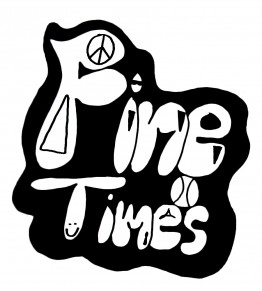
“We were suddenly going to be in the studio in less than four weeks and hadn’t finished or even played most of these songs,” says Matt Moldowan (vocals) about Fine Times’ first foray into recording a full-length album. A year ago, Moldowan and bandmate Jeffrey Powell (bass) made a list of people that they wanted to work with, and at the top was legendary Vancouver producer Howard Redekopp (New Pornographers, Tegan & Sara, Mother Mother). When they tossed around the idea of working together, Redekopp said he just happened to be finishing another project and had a window of a few months to work with them. Their alternative? Wait another year for him. The timing was right, but also a wake up call for Moldowan and Powell.
The duo hired musicians to track drums, horns, some guitar, and backing vocals. The gang went into the studio in the winter, mixed in the spring, and played a couple local gigs in the summer. Now in the throes of autumn, the band includes Juice (drums), Jahmeel Russel (guitar), and Max Sample (keys). Discorder stopped by Powell’s West End apartment to interview him and Moldowan the night before the album’s release.
Their partnership began at Music World before closing in 2004. The two, who rarely worked together or even spoke, finally struck up a conversation in the back of the pop/rock section during Powell’s last shift. When he mentioned that he played music, he recalls that Moldowan replied, “I, too, write music. Pop radio hits.” They laugh, and Moldowan denies he said it that way.
“Or something to that extent, I remember him being very young and very cocky,” recalls Powell.
Thus, the seeds for Fine Times were planted. Those same seeds grew into their first band, 16MM. “Then there was a bunch of boring in-between stuff, where nothing really happened. And now we’re Fine Times,” says Moldowan.
When their 16MM manager Johnathan Simkin decided to formally create Light Organ Records in early 2010, it was a “no brainer,” according to Moldowan, that they would be included. They already had a great relationship with Simkin, who was very hands off about their joining the label. “He basically said just go make the record and send it to me when it’s done.”
Originally, Moldowan wanted to call the band Times, but Powell wasn’t feeling it. “There’s a lot of shitty band names out there,” says Moldowan. “Really you just have to have a band name that’s okay… Then the name becomes cool by doing something that’s worthy. Take away the bias that you have toward the band, because you know all of their material, and just look at the name. If you’ve never heard anything by U2, for example, it’s kind of a shitty name. So the band name just needs to be okay.”
While searching for something better, Powell stumbled upon Fine Times: An Oral Memoir, a fictional piece by Woody Allen. The hippie in him saw the happy accident as a sign.

The two have played together long enough to be comfortable making fun of each other, and their dynamic works both as friends and bandmates. Powell seems more focused on the smaller details and the business side of the band, while Moldowan is more focused on the meaning behind the music.
When asked about metaphors in some songs, Powell defers to Moldowan. When asked about the track sequence, Moldowan defers to Powell. “That’s how things sort of teeter with us,” says Powell. “I’m concerned with the visual elements and the track listing, but if Matt leaves to go to the bathroom, I couldn’t fully explain the meaning of that song.”
“Sometimes [a song] just comes together really quick. Those are the best songs. That’s why ‘Hey Judas’ just always feels right because it came together really quick,” says Moldowan
“That’s the most important part about writing pop songs. You’ve got to make it feel like someone’s familiar with it already, and you’ve never heard it before. Ultimately that’s what makes the song catchy. It sticks in your head. It’s comfortable.”
And listening to Fine Times does indeed sound familiar. They’ve incorporated epic song intros reminiscent of the Killers, musical interludes of Phoenix, melodies of Two-Door Cinema Club, and the energy of the Strokes. Give the album a few listens, and chances are you’ll be singing along. Tracks like “High Brow, Low Times,” “Lions,” and “Into the Mechanarium” with their repetitive choruses, simple lyrics, and bop-your-head-along melodies, are songs you’ll be happy to have stuck in your head, long after the album is done.
From start to finish, it’s an impressive debut effort from this band that has the timing just right and the name just fine.

